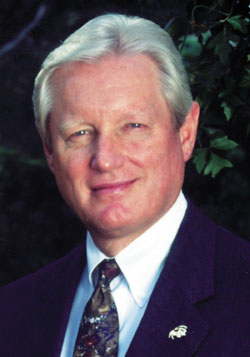 In his 10th and final State of the University address in 1993, WSU's 10th president shared a bit about his growing-up years in Tidioute, Pa., population 844, and applauded the individuals who had shaped his values — values that led him to a lifetime commitment to "the life of the mind."
In his 10th and final State of the University address in 1993, WSU's 10th president shared a bit about his growing-up years in Tidioute, Pa., population 844, and applauded the individuals who had shaped his values — values that led him to a lifetime commitment to "the life of the mind."
Warren Armstrong told the audience: "We all came into higher education believing that ours was the power and responsibility to help others in the development of their own unique lives, directly or indirectly, to empower, to enrich, to enable, to enhance, never to exploit."
Arriving on campus in 1983 after serving as president of Eastern New Mexico University, Armstrong, a historian by educational training, identified the expansion of the doctoral program as one of his primary objectives at WSU.
"I want to see WSU's capacity for research expanded," he added. "That should go hand in hand with expanding our doctoral programs." He also brought with him a belief that the university and its wider community would benefit from a synergistic relationship.
He delivered on all three of these goals: Doctoral programs increased from two to nine, with the addition of programs in electrical, mechanical and industrial engineering and psychology, chemistry, education and mathematics. Sponsored research activities tripled.
The National Institute for Aviation Research (which now holds three Center of Excellence FAA designations) was established. And 376,000 square feet of new facilities were added, including Devlin Hall, Wiedemann Hall and the Woodman Alumni Center.
Armstrong also sought and achieved membership for the university in the National Association of State Universities and Land Grant Universities, arguing that WSU is an "urban grant" university just as KSU serves the agricultural community.
Yet Armstrong's presidency also saw conflict: the elimination of football in 1986, for example, and contentious relations with faculty based on honest disagreements about educational philosophy. In a 1993 article written jointly by Armstrong and Kathryn Griffith, a WSU political science professor, the two explained: "Unlike many other institutions in our society, universities must foster differences of opinion."
There was never, however, a difference of opinion about this gracious but private man's respect for and dedication to the university he had grown to love.
James J. Rhatigan, longtime and former WSU vice president of student affairs, credits Armstrong with "the strength and reputation of our faculty, particularly through the introduction of doctoral programs. He overcame objections by our sister institutions about our capability to provide programs in engineering, and history shows how right he was to pursue those programs."
When Armstrong announced plans to retire from the WSU presidency in 1992, then Kansas Board of Regents chairman Jack Sampson said, "Significant achievements have been made at the university since Dr. Armstrong's arrival. Highlights of his tenure include the establishment of WSU's research mission focused on the business and manufacturing environment in which the university is located, the creation of NIAR and the completion of the university's first major capital campaign, the $100 million 'Commitment to Excellence.' His accomplishments will be appreciated by WSU and the Wichita community for many years to come."
In 1993, Armstrong returned to his self-professed "unending interest in the Civil War," teaching a class on it and publishing a book on the role of Union chaplains.
"I know I will miss university life," he said when he retired from teaching. "I've been on one side of the desk or the other ever since the fall of 1939," referring to his journey from elementary school to college professor, dean and university president. "It's been a good life."
Warren Armstrong died Oct. 1 in Afton, Okla.





